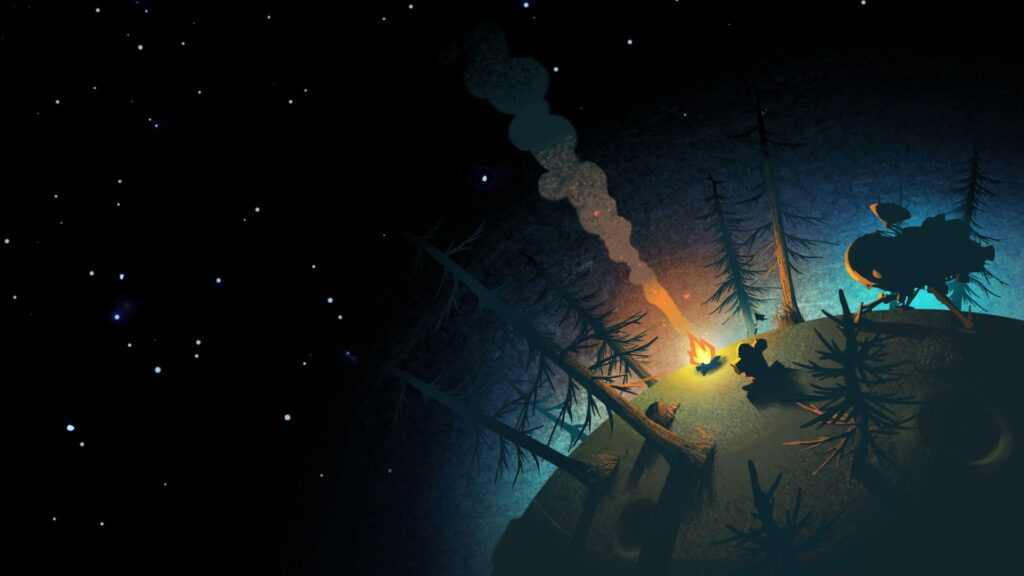
When Does Outer Wilds Get Good?
The only appropriate answer here is that it takes Outer Wilds about 22 minutes to get good. But seriously, fans who figure out the gameplay loop are rewarded with an immersive journey through space and philosophy in such memorably beautiful fashion that it should take less than a few hours to determine whether or not this is a game for you.
What Fans Say
Fans of Outer Wilds often describe it as a transformative experience in gaming. Praised for its breathtaking exploration, intricate narrative, and emotional depth, players applaud the game’s ability to weave mystery and discovery seamlessly. The open-ended nature of its universe allows players to craft their own journey, unraveling clues at their own pace. Fans often cite the thrill of uncovering the secrets of the Nomai civilization and the game’s clever use of time-loop mechanics, which keeps the stakes high without overwhelming frustration.
The music and atmosphere are also major highlights, with fans noting how the score enhances the sense of wonder and melancholy that permeates the game. Many players find the philosophical themes of mortality, the nature of the universe, and the human desire to understand particularly impactful. It’s not uncommon for fans to describe Outer Wilds as more than just a game but a life-changing experience.
—
—
What Haters Say
Despite its acclaim, Outer Wilds is not without criticism. Some players find its open-ended structure disorienting, particularly those accustomed to more guided experiences. The absence of traditional objectives or clear markers can make progress feel frustrating for some, especially when they hit a wall with puzzles.
The time-loop mechanic, while innovative, has also drawn criticism. For some, the repetitive 22-minute cycles can feel restrictive or tedious, especially when trying to complete complex tasks. Additionally, the lack of combat or traditional gameplay mechanics may alienate players seeking a more action-oriented experience.
Technical complaints, such as performance issues on certain platforms or occasional bugs, have also been noted. Lastly, Outer Wilds demands patience and a willingness to embrace failure, which might not appeal to every type of gamer.
Aggregated Critic Commentary
Critics universally praise Outer Wilds for its ambition, creativity, and narrative depth. It has been lauded as a masterclass in environmental storytelling, with reviewers noting how its universe feels alive and meticulously crafted. Many applaud the way it encourages curiosity, rewarding players with profound moments of realization as they piece together its mysteries.
The game’s approach to non-linear storytelling has been particularly celebrated. By giving players freedom to explore and discover, Outer Wilds fosters a sense of agency and immersion rarely seen in games. Critics also highlight its emotional resonance, with the game’s ending often described as hauntingly beautiful.
However, critics acknowledge that Outer Wilds is not for everyone. Its deliberate pacing and cryptic puzzles may alienate those seeking a more traditional gaming experience. Some reviews note that the game’s learning curve and reliance on player experimentation could be daunting. Despite these caveats, Outer Wilds is frequently hailed as one of the most innovative and rewarding games of its generation.
Overview of the Game
Outer Wilds is a first-person adventure game developed by Mobius Digital and published by Annapurna Interactive. It places players in the role of an astronaut from the Hearthian species, embarking on their first spaceflight to explore the mysteries of the Outer Wilds Ventures’ solar system. The game’s premise revolves around a 22-minute time loop, resetting the universe to the moment before the star at its center goes supernova. Players must use these repeated loops to unravel the enigmatic story of the Nomai, an ancient civilization.
The game’s world is richly detailed, featuring unique planets and locations, each with its own set of physics and environmental challenges. From the crumbling sands of Ash Twin to the eerie depths of Dark Bramble, each area offers unique experiences and secrets to uncover. The narrative unfolds organically, with players piecing together the story through exploration and observation.
Outer Wilds challenges conventional gaming norms by eschewing combat and traditional objectives, focusing instead on discovery, learning, and problem-solving. Its themes of curiosity, legacy, and the passage of time resonate deeply, offering players an unforgettable journey through a beautifully crafted cosmos.
Similar Games
- The Witness
A puzzle-driven exploration game with a focus on discovery and environmental storytelling. Its open-ended design and mind-bending puzzles make it a natural recommendation. - Subnautica
This survival-exploration game immerses players in a mysterious underwater world filled with secrets. Like Outer Wilds, it encourages curiosity and experimentation. - Firewatch
A narrative-driven game set in the Wyoming wilderness, offering a similarly introspective and atmospheric experience. - No Man’s Sky
A vast exploration game with an open universe, allowing players to uncover mysteries at their own pace. Recent updates have added depth, making it closer to Outer Wilds in its exploration aspects. - Journey
An artistic and emotionally resonant game that focuses on exploration and discovery, capturing a similar sense of wonder.
If You Like These, You’ll Like This Game
- The Talos Principle
A philosophical puzzle game that explores deep themes of consciousness and existence, echoing the intellectual and emotional depth of Outer Wilds. - Astroneer
A sandbox exploration game set in space, offering a relaxing yet rewarding experience of uncovering secrets on alien planets. - Kentucky Route Zero
A surreal narrative adventure game that delves into existential themes and mystery, akin to the philosophical tone of Outer Wilds. - Return of the Obra Dinn
A detective game where players unravel a ship’s mysterious fate through deduction and exploration, similar in its reliance on player-driven discovery.